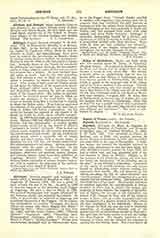

Aiblinger, JOHANN CASPAR, composer, b. February 23, 1779, at Wasserburg, Bavaria; d. at Munich, May 6, 1867. In his eleventh year he commenced his studies at Tegernsee Abbey, where he was instructed in piano, and organ-playing. Four years later he entered the gymnasium at Munich, where he studied under Professor Schlett, his countryman. Thence he went (in 1800) to the University of Landshut. Inwardly drawn to the Church, he completed his philosophy and began theology, but the secularization of many religious orders in Bavaria prevented his entrance into a cloister. He now devoted himself solely to music. Led by the then prevailing idea that without a visit to Italy no musical education is complete, he turned his footsteps southward. After a stay of eight years at Vicenza, where he fell under the influence of his countryman Simon Mayr, Aiblinger (1811) went to Venice and there met Meyerbeer, who procured for him an appointment at the Conservatory. His failure to establish a school for classical music led him to Milan to assume the direction of the local ballet. On his return to Bavaria King Max I invited him to Munich to direct the Italian opera. King Ludwig appointed him director of the royal orchestra, and sent him to Italy to collect old Italian masterpieces. On his return he became the organist of the church of All Saints, for which he wrote many valuable compositions. In 1864 he resigned, on account of advancing years. Between 1820 and 1830 he tried operatic composition, but was unsuccessful. A crusade against Italian music, which led to the revival of Gluck’s “Iphigeneia in Tauris”, followed. Then he took up church music, studying the old masters and procuring performances of their works. He also wrote much church music, which is generally full of simple dignity and great purity, with a certain degree of freedom, but it is stiff, dry, and weakly sentimental. His instrumentation is not strong. He was, however, inspired with the spirit of the Church. Of his numerous compositions, comprising masses and requiems, offertories and graduals, psalms, litanies, and German hymns, many have been published at Augsburg, Munich, Ratisbon, and Mainz. His choicest works, consisting of masses, vespers, motets, etc. (133 in number), are preserved in the archives of the royal court chapel in Munich.
J. A. VOLKER

